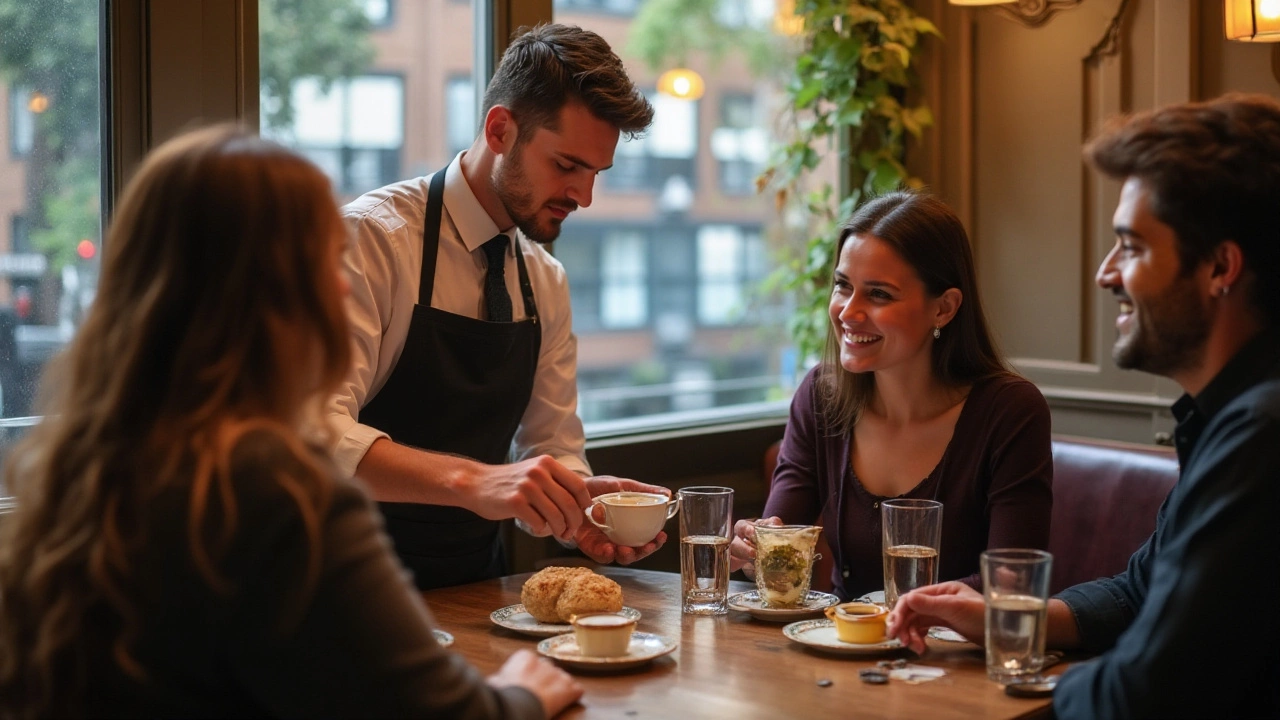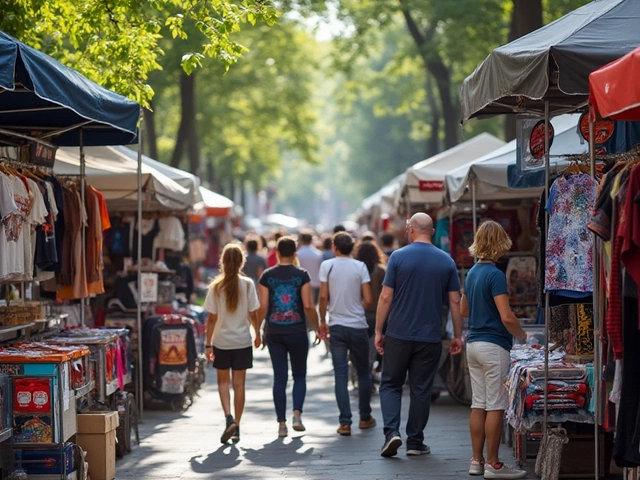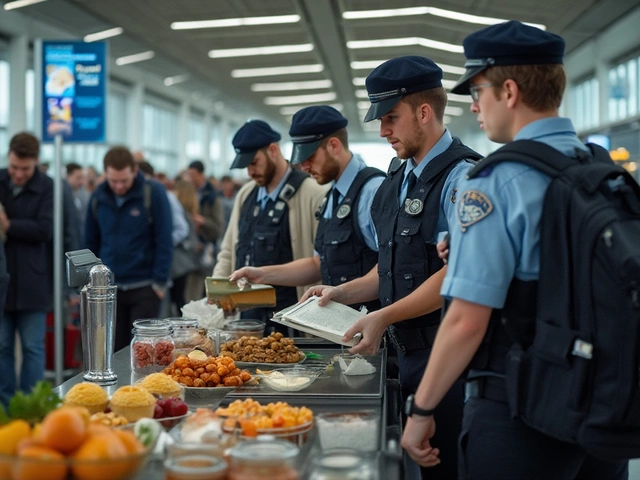Traveling to London and unsure about tipping can make anyone second-guess their manners. The city, known for its rich history and cultural charm, also presents a unique set of expectations around tipping. The question many ask is, 'Is it rude not to tip in London?' Well, the answer is not as straightforward as one might think.
In London, tipping isn't always mandatory as it might be in other parts of the world. Yet, it's often appreciated and can depend largely on the service you receive and the establishment you're visiting. From swanky restaurants to everyday cafes, understanding when and how much to tip can make your experience smoother and help you blend seamlessly into the local culture.
- Understanding Tipping Culture in London
- When Tipping is Expected
- Situations Where Tipping is Optional
- How Much to Tip
- Tipping Beyond Restaurants
Understanding Tipping Culture in London
Wandering through the bustling streets of London, one might encounter various dining establishments and wonder about the city's tipping culture. Unlike the automatic gratuities expected in certain parts of America, London's tipping practices rely heavily on discretion and the situation at hand. The notion of tipping has evolved in the UK, and it's shaped by historically traditional values and the practicalities of modern hospitality.
In central London, where a wide mix of tourists and locals converge, it's not uncommon for trendy restaurants to include a service charge of 12.5% on the bill. This fee is often clearly stated, but it's something to keep an eye on. If such a charge is added, you're usually not pressured to tip more on top. But if a service charge isn't included, leaving a bit more is generally considered polite, especially if the service exceeded your expectations. Simultaneously, in a cozy, quaint café or pub where food and drinks flow comfortably, tipping is less structured, leaving you to rely on your perception of service quality.
The cultural nuances in London spill over into alternative service settings such as taxis or hotel stays. When hailing a black cab, rounding up to the nearest pound or adding a 10% tip usually suffices, highlighting the preference for flexibility and voluntary gratitude over rigid rules. At hotels, porters might appreciate a couple of pounds per bag, and leaving a small token for the housekeeping staff is a thoughtful gesture many foreigners might overlook but which reflects a kind acknowledgment of unseen efforts.
Despite these practices, the tipping culture in London is generally less obligatory and more about rewarding excellence and kindness. As the UK aims for a more equitable service pay model, it's pertinent to recognize that many London establishments already implement fair wages where tips are a welcome supplement, not a core necessity. According to VisitBritain, around 25% of London diners still leave a tip in restaurants, indicating that while not compulsory, tipping is regularly practiced and positively received.
"Tipping is always appreciated, but I don't think not doing so is rude. It's more about recognizing good service," says Laura Porter, a London local and travel writer, who emphasizes understanding and adapting to different norms while traveling.
As a visitor trying to navigate these expectations, showing genuine warmth and modesty in your actions can create a pleasant experience for both you and those serving you. This way, you embrace London's unique lens on tipping, which combines openness and choice with occasional expectations, creating a dynamic yet unobtrusive system of appreciation.
When Tipping is Expected
Understanding when tipping is expected in London can significantly enhance your dining and service experiences. Unlike some countries where tipping is exclusively a customary practice, in London, it's a mix of tradition and discretion. In the realm of dining, particularly at sit-down London restaurants, it is common to leave a tip. Typically, a 10-15% tip is added to your bill if the service was satisfactory. Often, you will find that an item labeled as a 'service charge' has already been included, especially in higher-end establishments. This can offer relief from the uncertainty of calculating the right amount. However, always check your bill to ensure you understand what's included.
At bars and pubs across London, the tipping culture varies greatly from what you might find at restaurants. Generally, tipping bar staff isn't obligatory, but it's appreciated. If you've received exceptional service or engaged in friendly conversation, it's polite to offer the bartender to 'have one for yourself.' This gesture reflects British pub culture's casual camaraderie, adding to the lively atmosphere of London's social scene.
Transportation services like taxis also present scenarios where tipping etiquette comes into play. For black cab drivers and ride-sharing services, rounding up to the nearest pound or adding a tip of about 10% is common if the journey was pleasant and the driver courteous. However, again, this isn't mandatory, as fares are often inclusive of service. Some travelers might operate under the rule of thumb to only tip if drivers assist with luggage or go out of their way to provide excellent service.
"Tipping is a sign of gratitude, not a legal obligation," explains etiquette expert William Hanson. "But in places where it’s customary, like some of London's finer dining establishments, it’s a kind gesture to show appreciation for good service."
Moreover, in hotels, tipping becomes a bit more nuanced. For porters and doormen, a small tip of £1 or £2 is quite customary for services such as carrying luggage or hailing a taxi. Housekeeping staff, often the unsung heroes of your stay, appreciate a few pounds left in the room upon your departure as a sign of thanks for maintaining a clean and comfortable environment during your visit.
Notably, London's diverse service sector implies that practices can vary significantly across different industries. It's always wise to be observant and perhaps take cues from locals if you're unsure. Some venues might explicitly state their tipping policy, alleviating any doubt on your part, while other places, especially those aiming to accommodate international guests, will happily answer any questions about tipping expectations. Embracing these customs not only enriches your visit but also ensures that you're respectfully engaging with local traditions.
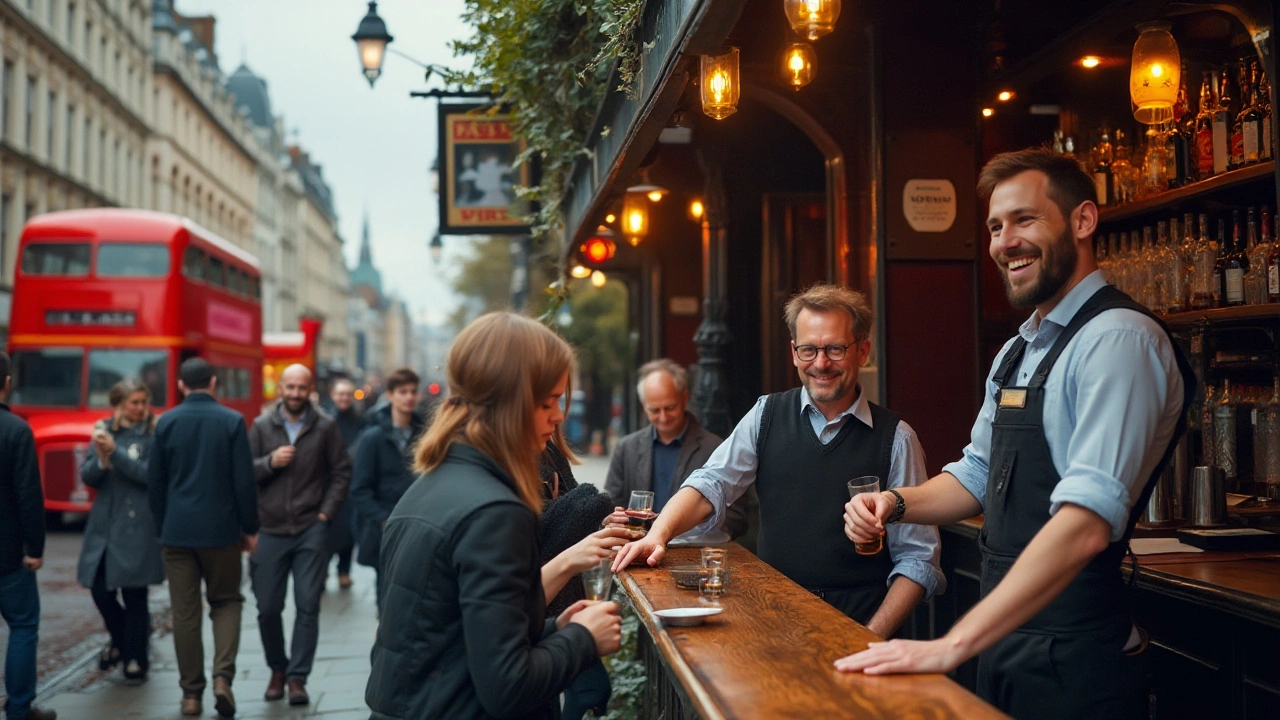
Situations Where Tipping is Optional
In vibrant London, a city that beautifully blends tradition with modernity, the question of tipping is as nuanced as its cultural landscape. While some settings clearly expect a tip, others leave it to the discretion of the customer. Understanding when tipping is optional can save you from potentially awkward situations while still allowing you to express your appreciation in a meaningful way. One such instance where tipping isn't a rigid requirement is in everyday cafes or casual dining spots, where the total bill often includes service charges. This means tipping is more of a gesture than an obligation, especially if a service charge has been added. It's worth noting that unlike in some cultures, not tipping won't typically be met with a cold shoulder. Instead, service staff in London are accustomed to varying tipping practices and appreciate any additional gratuity purely as a bonus.
Another scenario where tipping can be optional surrounds services like taxi rides. Black cab drivers, for instance, won't expect a tip, though rounding up to the nearest pound or two is a common courtesy that many locals practice. This custom lives in the sweet spot between obligatory and unexpected, allowing the rider to offer tips based on satisfaction rather than convention. The unspoken rule is that a smile and polite interaction can often substitute for monetary gratitude.
When visiting salons or getting personal services, tipping can also fall into the optional category. Many people opt for a small gratuity, particularly if they feel the service exceeded expectations. This kind of tipping is generally perceived as a personal choice rather than a social rule. According to a recent survey by The Guardian, around 37% of Londoners only tip when service is significantly above average, contrasting with visitors who might be more generous, aiming to adhere to different cultural norms. This survey highlights how tipping etiquette can vary widely, not only culturally but also individually, allowing patrons to tip—not because they must, but because they wish to convey an extra layer of thanks.
How Much to Tip
When it comes to understanding how much to tip in London, context plays a crucial role. In the city's myriad dining establishments, for instance, a tip of 10-15% is typically seen as generous and adequate. Many restaurants will automatically add a service charge to your bill, which usually lands around 12.5%. It's important to check your bill to see if this charge has already been included. If the service charge isn't listed, that's when a tip in the 10-15% range is often welcomed. Interestingly, table service at pubs isn't as common as in restaurants, so tipping isn't generally expected there, although rounding up to the nearest pound for exceptional service is always appreciated.
Hotels in London also follow their own rules. Porters who assist you with luggage might expect a small tip, typically around £1 to £2 per bag. Housekeeping might appreciate a couple of pounds left in the room at the end of your stay, although this isn't obligatory. In high-end hotels, tipping the concierge can be more common, especially if they go out of their way to provide assistance like securing those hard-to-get theater tickets or reservations at a top London restaurant.
One aspect unique to London, and the UK more broadly, is the taxi service. A rule of thumb is to round up the fare to the nearest pound. If your driver was particularly helpful, perhaps offering baggage assistance or taking a scenic shortcut during busy hours, a 10% tip could be a nice gesture. Many Londoners forego the tip when using rideshare services like Uber, although the app provides an option to do so if desired.
According to the UK Hospitality Code of Practice, "Employers should not use tips, gratuities, and service charges to make up national minimum wage payments." This highlights the need to ensure tips reach the staff directly without any deductions.
Ultimately, the balance between being generous and being wise with your money is the key when deciding on gratuity. For large groups dining out, checking the bill to see if a service charge has been included can save embarrassment or confusion when it comes to settling the check. In formal settings, your host or the staff can usually guide you if you're unsure. Remember, showing appreciation goes beyond monetary gestures, and a sincere 'thank you' is always at home.
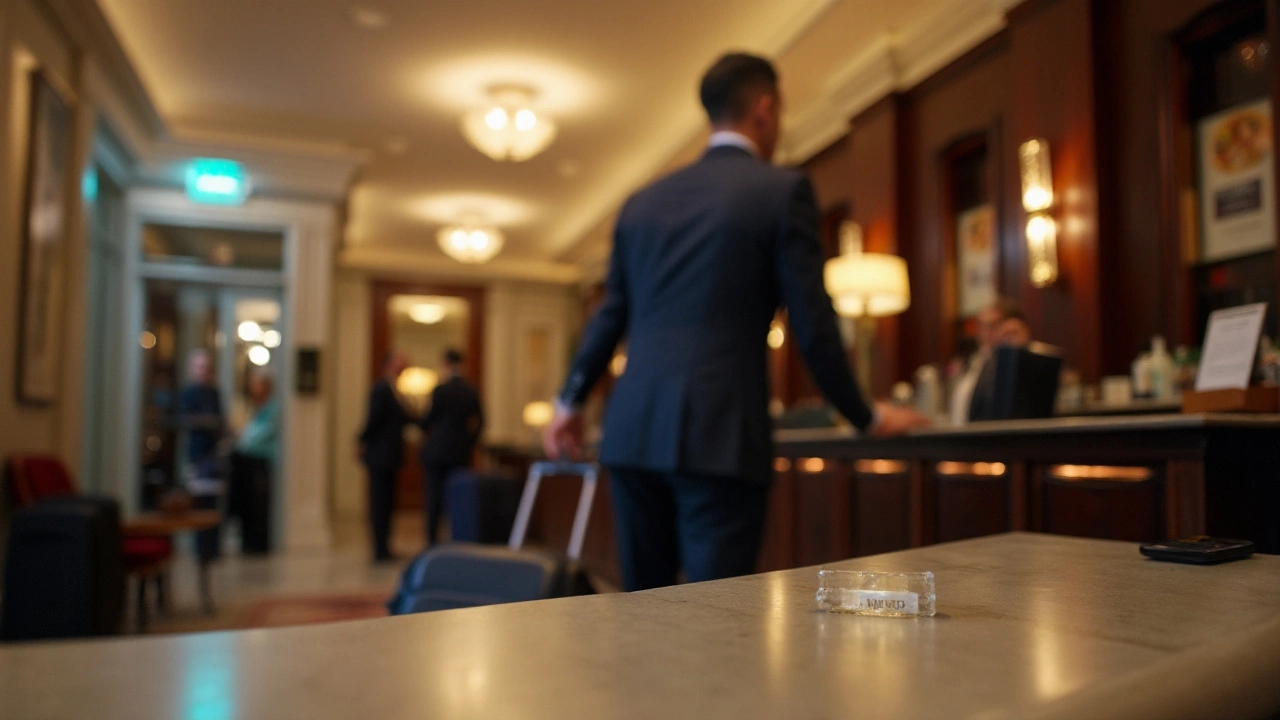
Tipping Beyond Restaurants
While dining out in London might be the first scenario that springs to mind when discussing tipping etiquette, there are numerous other situations where leaving a tip could be appropriate. Take, for instance, taxis. London cab drivers are known for their expert knowledge of the city and friendly service. If you find yourself in a traditional black cab, adding around 10% to 15% to the fare is a customary way to show appreciation for their service. Many passengers round up to the nearest pound as a matter of convenience. According to Transport for London, most drivers don't expect a tip, but they do appreciate it as a kind gesture.
Staying in hotels often presents several more opportunities for tipping. From the porters who carry your luggage to room service providers, small gratuities can go a long way. The suggested amount for porters is around £1 to £2 per bag, and for housekeeping, leaving a few pounds for prolonged stays is a subtle way to express thanks. Room service, when not already including a service charge, is another area to consider an additional tip. Sometimes, adding a couple of pounds to the bill is welcome, enhancing your overall experience.
In recent times, valet services, though not as ubiquitous in London as they might be in the United States, are becoming more common in upscale areas and hotels. When you do encounter a valet, offering £5 upon the safe return of your vehicle is a thoughtful way to acknowledge their service. This can ensure that staff remember you favorably on repeat visits. An unusual yet emerging service to tip is for personal care services like spas or hairdressers. Though a service charge may often be included, leaving an extra 5% to 10% directly to the therapist or stylist can be a warm acknowledment of exceptional service.
Tour guides provide another facet of the London tipping culture. If you embark on a guided tour through the historic streets or iconic landmarks, a gratuity of about £2 to £5 per person can express your appreciation. Freelance guides or those operating smaller, more intimate tours might rely on these tips as a significant part of their income. It's a token of appreciation that can make their day brighter and your tour experience even more personal. Tips are not obligatory, but they do contribute to a positive interaction that often transcends usual tourist experiences.
According to a survey by VisitBritain, "While tips aren't expected in every situation in the UK, they are warmly received in the hospitality sector, where service professionals encounter tourists regularly." This insight sheds light on how visitors can heavily impact service standards and perceptions through simple gestures.
The approach to tipping for delivery services is somewhat fluid. With the rise of food delivery apps, you might wonder if digital tipping is necessary. Although not a traditional norm, grateful patrons sometimes add a small tip for prompt and friendly service. Leaving a few pounds or choosing a percentage option within the app itself can foster goodwill. This gesture can be a nod to the often rushed yet dedicated service delivery personnel provide in the bustling cityscape. Here, digitization has transformed the tipping norm, merging convenience with old-world courtesy.
